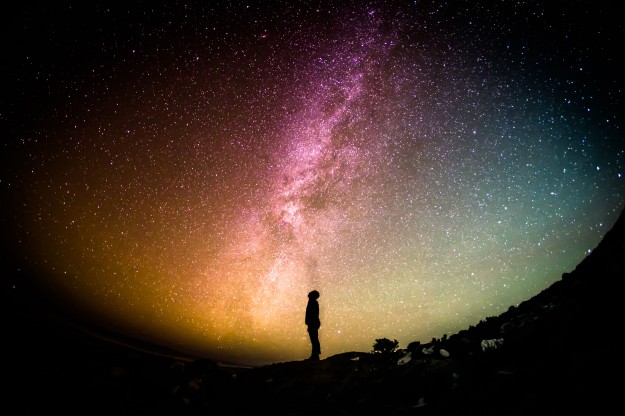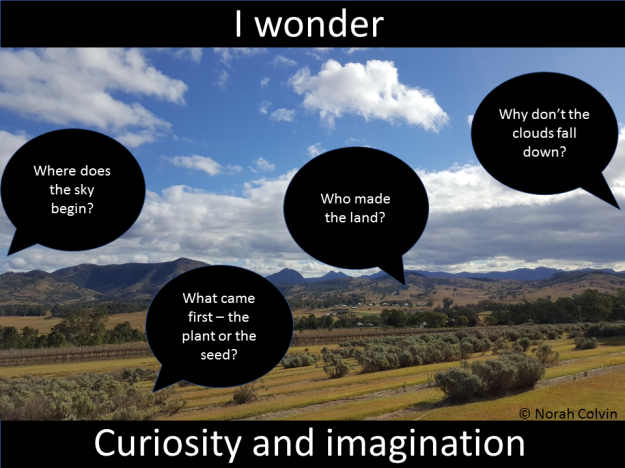
Just like scientists, children are curious, constantly asking questions, wanting to know why or how. Parents and teachers don’t always know the answers. In fact, there may not even be an answer – yet. The need to know is strong and “just because” won’t do. Coupled with creativity, thinking up new ideas and possibilities, curiosity has taken us beyond the imagination of myths and legends to knowing and understanding.
This week at the Carrot Ranch, Charli Mills has challenged writers to “In 99 words (no more, no less) write about a creation myth. You can write your own, use one in a story or create tension (or comparability) between science and culture on the topic of creation.” As usual, she tells us to “Go where the prompt leads.”
Every culture has its own creation stories, told from the beginning of time when humans first walked the earth. Through stories, people attempted to explain their own existence and that of everything observable.
With only the skies for night-time entertainment, people found stories in the stars. As Duane W. Hamacher says in Kindred skies: ancient Greeks and Aboriginal Australians saw constellations in common in the Conversation, “What we don’t yet know is why different cultures have such similar views about constellations. Does it relate to particular ways we humans perceive the world around us? Is it due to our similar origins? Or is it something else? The quest for answers continues.”
As with stories told of the stars, there are some threads common to many creation myths, including stories of the first man and woman, stories explaining the existence of the animals and why they behave the way they do. I have read quite a few stories of floods, which I guess is understandable as these events occur worldwide.
What I love about the creation myths is that they testify to the innate curiosity and creativity of humans; the need to know and the sense of wonder combined with imagination and storytelling.
It is important to keep this sense of wonder and curiosity alive in children, and adults, also. Just a few days ago, as reported by Ray Norris in the Conversation, Exoplanet discovery by an amateur astronomer shows the power of citizen science. He says this discovery “will help us understand the formation of our own Earth. It’s also a step towards establishing whether we are alone in the universe, or whether there are other planets populated by other civilisations.”

I think of questions asked by my granddaughter; for example, “Who came first, the mother or the baby?”, “If there’s gravity, why don’t the clouds fall down?” or “Where does the sky begin?”
It is interesting now in this age of technology, almost everything we want to know is just a tap of a few keys or buttons away.

The other day I visited a nature reserve with my two grandchildren. (We went especially to see three baby bilbies which had recently emerged from their mother’s pouch, but saw other things too.)
We were looking at some black swans, which are native to Western Australia. GD informed me that white swans are not native to Australia. When I admitted that I’d never thought about that, she said, “Look it up. Look it up now. You’ve got your phone in your hand. Just look it up.” She was insistent and I did as told. She was right, of course.
How different this experience is from that of the first humans. Young children expect to be given answers based upon science or collective knowledge, not stories. But we still do not have answers to everything. As Duane W. Hamacher says, “The quest for answers continues.”
In response to Charli’s challenge, I have not written a creation story. However, I have included the same ingredients that contributed to their creation: wondering, questioning, and imagination.
Unanswered questions
“What are you doing?”
“Pulling out weeds.”
“Why?”
“So the carrots have more room.”
“Why?”
“So they can grow big and juicy.”
“Why?”
“So they are good to eat for our dinner.”
“Why?”
“To keep us healthy?”
“I want to be healthy.”
“It’s good to be healthy.”
“I don’t want to die.”
“You won’t die. Not for a long time.”
“How do you know?”
Silence. How does anyone know?
“Silas died.”
“Who?”
“Silas.”
“Who is Silas?”
“Was. Silas was my friend.”
“I don’t remember Silas.”
“He was my imaginary friend.”
“Oh. How did he die?”
“I killed him.”
“Why?”
Perhaps there are some things for which we may never know the answers; for example, Can imaginary friends die?

Thank you for reading. I appreciate your feedback. Please share your thoughts.


Pingback: Who’s That Blogger? Norah Colvin | Book Club Mom
ha v good Norah; mind you in this family it was mostly when ‘when are we there?’ ‘when’s supper’. Never ‘when’s bedtime’ though..
LikeLiked by 1 person
No, for children, bedtime is boring. My daughter used to tell me that sleep was a waste of time. I’m inclined to agree, but my body disagrees.
LikeLiked by 1 person
I’m sure that almost every parent must have gone through the “Why” stage at some point. I quite enjoyed the switch of roles at the end of your fiction.
LikeLiked by 1 person
Thank you, Steven. I’m pleased the switch worked. I thought most parents would identify. I apologise for taking so long to respond. I don’t know how I missed responding earlier.
LikeLike
Talk about an imagination to be looked into a little further? Loved it!
LikeLiked by 1 person
Thanks so much, Roger. I apologise for taking so long to respond. I’m not sure why your comment escaped my attention earlier.
LikeLiked by 1 person
Pingback: Origin Stories « Carrot Ranch Communications
How interesting that ancient cultures saw the skies in similar ways despite not having global Google. Here in New Mexico, alien sightings are common. I’d dismiss it except for the lingering legends of the Zuni about the skinwalkers who cross the sky. I enjoyed your flash and laughed at the mother’s turn to ask why! I think imaginary friends can die, but why?
LikeLike
Hubby and I were in a restaurant yesterday and they were playing “oldies” music in the back ground. We found ourselves listening to the words, “I’ll be alone each and every night … See you in September…” Okay, who was singing that? Hubby’s first guess was the Beach Boys. Then we went on to try various options, none of which seemed to feel right. I automatically pulled out my phone, typed in a few letters and then with a Cheshire grin, announced that it was “Frankie Valli and the Four Seasons.” This wasn’t the first time I’d done something like this. Looks like I have I’m one of those who has embraced your granddaughter’s attitude, “You’ve got your phone in your hand. Just look it up.” 🙂
LikeLiked by 1 person
That’s great to hear, Kate! I’m the same too. Why remain ignorant if you don’t need to! Though I have a friend who objects to people checking things out on their phones- he says to look it up later. Trouble is, we often forget later!
LikeLike
Most excellent! I loved the Why Game, even when my kids did it to me, and I love your twist ending.
LikeLiked by 2 people
Thank you, Deborah. 🙂
LikeLike
Children have the purest imaginations. It’s important in order to help them grow educationally and spiritually to answer their questions. Now they are even reminding us to look up answers. Whoduthunk Google would replace Encyclopedia Britannica, lol. 🙂
LikeLiked by 2 people
That’s true, Debby. And you’re right – Whoduthunk!
LikeLiked by 2 people
🙂
LikeLike
An excellent post, Norah. My oldest son, Gregory, has always been a great questioner of everything – I bought him a series of Disney books called Mickey wonders why to deal with all his questions. I enjoyed your flash fiction – this is just what children do and they certainly have some interesting thoughts.
LikeLiked by 2 people
Thank you so much for your supportive comment, Robbie. Yes, with children, it can be quite surprising where the conversations lead. 🙂
LikeLiked by 2 people
Awesome take. And of course imaginary friends can die. Have you never killed a character in a story of yours?
LikeLiked by 2 people
Of course! I just killed that one. 🙂 Thanks for reading and commenting.
LikeLiked by 1 person
Brilliant, Norah, both your celebration of curiosity and the surprise ending of your flash. I’m still laughing.
LikeLiked by 2 people
Thank you, Anne. I’m pleased it amused you. 🙂
LikeLiked by 1 person